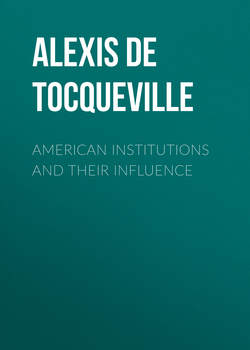Читать книгу American Institutions and Their Influence - Alexis de Tocqueville - Страница 29
AMERICAN INSTITUTIONS
CHAPTER VIII
SUMMARY OF THE FEDERAL CONSTITUTION
ОглавлениеDivision of Authority between the Federal Government and the States.—The Government of the States is the Rule: the Federal Government the Exception.
The first question which awaited the Americans was intricate, and by no means easy of solution; the object was so to divide the authority of the different states which composed the Union, that each of them should continue to govern itself in all that concerned its internal prosperity, while the entire nation, represented by the Union, should continue to form a compact body, and to provide for the exigencies of the people. It was as impossible to determine beforehand, with any degree of accuracy, the share of authority which each of the two governments was to enjoy, as to foresee all the incidents in the existence of a nation.
The obligations and the claims of the federal government were simple and easily definable, because the Union had been formed with the express purpose of meeting the general exigencies of the people; but the claims and obligations of the states were, on the other hand, complicated and various, because those governments penetrated into all the details of social life. The attributes of the federal government were, therefore, carefully enumerated, and all that was not included among them was declared to constitute a part of the privileges of the several governments of the states. Thus the government of the states remained the rule, and that of the confederation became the exception.124
But as it was foreseen, that, in practice, questions might arise as to the exact limits of this exceptional authority, and that it would be dangerous to submit these questions to the decision of the ordinary courts of justice, established in the states by the states themselves, a high federal court was created,125 which was destined, among other functions, to maintain the balance of power which had been established by the constitution between the two rival governments.126
124
See the amendment to the federal constitution; Federalist, No. 32. Story, p. 711. Kent's Commentaries, Vol. i., p. 364.
It is to be observed, that whenever the exclusive right of regulating certain matters is not reserved to congress by the constitution, the states may take up the affair, until it is brought before the national assembly. For instance, congress has the right of making a general law of bankruptcy, which, however, it neglects to do. Each state is then at liberty to make a law for itself. This point, however, has been established by discussion in the law-courts, and may be said to belong more properly to jurisprudence.
125
The action of this court is indirect, as we shall hereafter show.
126
It is thus that the Federalist, No. 45, explains the division of supremacy between the union and the states: "The powers delegated by the constitution to the federal government are few and defined. Those which are to remain in the state governments are numerous and indefinite. The former will be exercised principally on external objects, as war, peace, negotiation, and foreign commerce. The powers reserved to the several states will extend to all the objects which, in the ordinary course of affairs, concern the internal order and prosperity of the state."
I shall often have occasion to quote the Federalist in this work. When the bill which has since become the constitution of the United States was submitted to the approval of the people, and the discussions were still pending, three men who had already acquired a portion of that celebrity which they have since enjoyed, John Jay, Hamilton, and Madison, formed an association with the intention of explaining to the nation the advantages of the measure which was proposed. With this view they published a series of articles in the shape of a journal, which now form a complete treatise. They entitled their journal, "The Federalist," a name which has been retained in the work. The Federalist is an excellent book, which ought to be familiar to the statesmen of all countries, although it especially concerns America.
